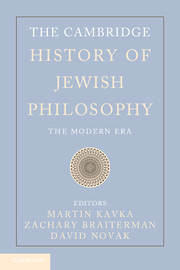Book contents
- Frontmatter
- Contents
- Contributors
- Acknowledgement
- Introduction
- I Judaism's Encounter with Modernity
- II Retrieving Tradition
- III Modern Jewish Philosophical Theology
- 10 God: Divine Transcendence
- 11 God: Divine Immanence
- 12 Creation
- 13 Revelation
- 14 Redemption
- 15 Providence: Agencies of Redemption
- IV Jewish Peoplehood
- V Issues in Modern Jewish Philosophy
- Bibliography
- Index
15 - Providence: Agencies of Redemption
from III - Modern Jewish Philosophical Theology
Published online by Cambridge University Press: 28 September 2012
- Frontmatter
- Contents
- Contributors
- Acknowledgement
- Introduction
- I Judaism's Encounter with Modernity
- II Retrieving Tradition
- III Modern Jewish Philosophical Theology
- 10 God: Divine Transcendence
- 11 God: Divine Immanence
- 12 Creation
- 13 Revelation
- 14 Redemption
- 15 Providence: Agencies of Redemption
- IV Jewish Peoplehood
- V Issues in Modern Jewish Philosophy
- Bibliography
- Index
Summary
In Jewish belief, divine providence, prophecy, and redemption can be interrelated in the following manner. Providence is God's supervision of human affairs and natural order. It is conceived by some (Maimonides, for one) to be expressed in causality and in the human capacity for free choice. The one who understands this best is the prophet, who is educated in natural science and is also a statesman, a political ruler whose actions are guided by the most refined understanding of divine providence. The prophet's goal, moreover, is imitatio dei, which involves both personal fulfillment and political leadership aimed at achieving the redemption of humankind from injustice and suffering.
The dominant reading of imitatio dei in rabbinic texts is the practical or ethical one, to follow the dictates of halakhah and thereby to cultivate what one might call virtues. Imitatio dei is neither a matter of apotheosis nor the perfection of rationality understood theoretically or contemplatively. Rather, it is a matter of cultivating those traits of character that lead regularly to conduct that is generous, merciful and patient, and by and large humane.
Often enough, accounts of the doctrine of imitatio dei in Judaism mention a famous passage from Plato's Theaetetus (176a6–b3). There Socrates tells Theodorus that evil can never be eliminated and that it clings to this world, so that a person should seek to flee the world, to escape the muck and mire of it all.
- Type
- Chapter
- Information
- The Cambridge History of Jewish PhilosophyThe Modern Era, pp. 465 - 498Publisher: Cambridge University PressPrint publication year: 2012

